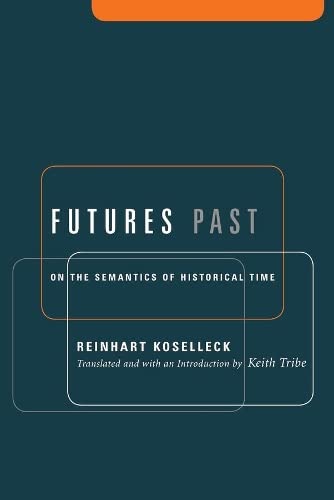Futures Past: On the Semantics of Historical Time (Studies in Contemporary German Social Thought.) - Tapa blanda
Libro 62 de 68: Studies in Contemporary German Social Thought
Sinopsis
Modernity in the late eighteenth century transformed all domains of European life -intellectual, industrial, and social. Not least affected was the experience of time itself: ever-accelerating change left people with briefer intervals of time in which to gather new experiences and adapt. In this provocative and erudite book Reinhart Koselleck, a distinguished philosopher of history, explores the concept of historical time by posing the question: what kind of experience is opened up by the emergence of modernity? Relying on an extraordinary array of witnesses and texts from politicians, philosophers, theologians, and poets to Renaissance paintings and the dreams of German citizens during the Third Reich, Koselleck shows that, with the advent of modernity, the past and the future became 'relocated' in relation to each other.The promises of modernity -freedom, progress, infinite human improvement -produced a world accelerating toward an unknown and unknowable future within which awaited the possibility of achieving utopian fulfillment. History, Koselleck asserts, emerged in this crucial moment as a new temporality providing distinctly new ways of assimilating experience. In the present context of globalization and its resulting crises, the modern world once again faces a crisis in aligning the experience of past and present. To realize that each present was once an imagined future may help us once again place ourselves within a temporality organized by human thought and humane ends as much as by the contingencies of uncontrolled events.
"Sinopsis" puede pertenecer a otra edición de este libro.
Acerca del autor
Reinhart Koselleck, now retired, was previously professor of historical theory at the University of Bielefeld, Germany. He is the author of The Practice of Conceptual History and Critique and Crisis.Keith Tribe was Reader in Economics at Keele University, UK, until 2002. He is now a private scholar and rowing coach at the King's School, Worcester.
"Sobre este título" puede pertenecer a otra edición de este libro.
Otras ediciones populares con el mismo título
Resultados de la búsqueda para Futures Past: On the Semantics of Historical Time (Studies...
Futures Past â" On the Semantics of Historical Time (Studies in Contemporary German Social Thought.)
Librería: WorldofBooks, Goring-By-Sea, WS, Reino Unido
Paperback. Condición: Very Good. The book has been read, but is in excellent condition. Pages are intact and not marred by notes or highlighting. The spine remains undamaged. Nº de ref. del artículo: GOR004978681
Comprar usado
Cantidad disponible: 1 disponibles
Futures Past: On the Semantics of Historical Time (Studies in Contemporary German Social Thought.)
Librería: BooksRun, Philadelphia, PA, Estados Unidos de America
Paperback. Condición: Fair. The item might be beaten up but readable. May contain markings or highlighting, as well as stains, bent corners, or any other major defect, but the text is not obscured in any way. Nº de ref. del artículo: 0231127715-7-1
Comprar usado
Cantidad disponible: 1 disponibles
Futures Past: On the Semantics of Historical Time (Studies in Contemporary German Social Thought.)
Librería: Academic Books, Rockville, MD, Estados Unidos de America
Nº de ref. del artículo: ABE-1762433663374
Comprar usado
Cantidad disponible: 1 disponibles
Futures Past On the Semantics of Historical Time
Librería: True Oak Books, Highland, NY, Estados Unidos de America
Paperback. Condición: Good+. Translation; First Printing. Studies In Contemporary German Social Thought. ; 9.06 X 6.06 X 0.69 inches; 317 pages; minor pencil markings on a few pages. Minor creasing on front cover's bottom corner. Very Good condition otherwise. No other noteworthy defects. ; Your satisfaction is our priority. We offer free returns and respond promptly to all inquiries. Your item will be carefully cushioned in bubble wrap and securely boxed. All orders ship on the same or next business day. Buy with confidence. Nº de ref. del artículo: HVD-65807-A-0
Comprar usado
Cantidad disponible: 1 disponibles
Futures Past: On the Semantics of Historical Time (Studies in Contemporary German Social Thought.)
Librería: Book Alley, Pasadena, CA, Estados Unidos de America
paperback. Condición: Good. Good. Used with wear but is still in solid reading condition. limited marks in text. Pasadena's finest new and used bookstore since 1992. Nº de ref. del artículo: mon0000749515
Comprar usado
Cantidad disponible: 1 disponibles
Futures Past : On the Semantics of Historical Time
Librería: GreatBookPrices, Columbia, MD, Estados Unidos de America
Condición: New. Nº de ref. del artículo: 2196796-n
Comprar nuevo
Cantidad disponible: 12 disponibles
Futures Past
Librería: PBShop.store US, Wood Dale, IL, Estados Unidos de America
PAP. Condición: New. New Book. Shipped from UK. Established seller since 2000. Nº de ref. del artículo: WI-9780231127714
Comprar nuevo
Cantidad disponible: 10 disponibles
Futures Past
Librería: PBShop.store UK, Fairford, GLOS, Reino Unido
PAP. Condición: New. New Book. Shipped from UK. Established seller since 2000. Nº de ref. del artículo: WI-9780231127714
Comprar nuevo
Cantidad disponible: 15 disponibles
Futures Past : On the Semantics of Historical Time
Librería: GreatBookPrices, Columbia, MD, Estados Unidos de America
Condición: As New. Unread book in perfect condition. Nº de ref. del artículo: 2196796
Comprar usado
Cantidad disponible: 12 disponibles
Futures Past: On the Semantics of Historical Time (Paperback or Softback)
Librería: BargainBookStores, Grand Rapids, MI, Estados Unidos de America
Paperback or Softback. Condición: New. Futures Past: On the Semantics of Historical Time. Book. Nº de ref. del artículo: BBS-9780231127714
Comprar nuevo
Cantidad disponible: 5 disponibles

